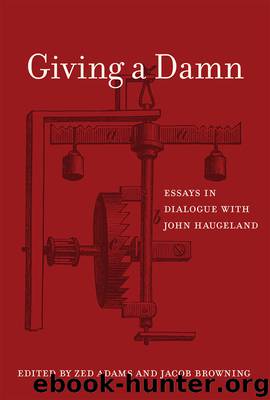Giving a Damn by Adams Zed; Browning Jacob; Blattner William & Jacob Browning & Unknown

Author:Adams, Zed; Browning, Jacob; Blattner, William & Jacob Browning & Unknown
Language: eng
Format: epub
Publisher: MIT Press
Published: 2017-01-27T00:00:00+00:00
Notes
1 See Kukla and Lance 2014 for an attempt to cash out this metaphor.
2 Haugeland’s work contains another tension. In papers like “Truth and Rule-Following,” his concern is objectivity, and this involves highlighting the way that our highly theoretical practices can be refuted by what happens in the world (and by the way those theoretical practices allow events in the world to have such significance.) In other places—most notably “Mind Embodied and Embedded”—he is concerned, essentially, to explicate Heideggerian comportment, focusing not on the normative significance of objects in refuting theories but on our thoroughgoing involvement with them in competent behavior. This paper tries to bring these sides of Haugeland’s thought together as much as it attempts to highlight the sociality of all such human practice.
3 Early mild skepticism emerged in chapter 2 of Lance and Hawthorne 1999, but I now think that insofar as a systematic account of language is possible, it is via a systematic pragmatics that sees semantic facts as arising here and there, for particular pragmatic purposes rather than via a systematic semantics. And I doubt that there can, in principle, be such a thing as a complete and systematic pragmatics. Indeed, I would like to argue one day that it is part of the essence of language that this is impossible.
4 Readers who are familiar with Haugeland’s work will recognize that my paper not only draws substantially on many of his ideas but is something of a formal homage to “Truth and Rule-Following,” in which Haugeland similarly tries to build up a notion of objective purport via adding successive layers to a simple form of practice.
5 I take these to be questions for the cognitive sciences and think that it is just a mistake to think that the phenomenological points Heidegger is making about the difference between the mode of understanding one has when engaged with the ready to hand, and when explicitly theorizing, have direct implications for questions about the way that either is engineered, or with, for example, the question of whether there is information processing going on at some level in the former case. Of course, I offer no argument for this view here.
6 Cf. Kukla and Lance 2009 for a definition and vindication of this terminology and the distinctions it codifies.
7 In the terms of that paper, our hunter-gatherers are at best super-squirrels, not claim makers.
8 The idea of a primitive simulation mode like this plays an explanatory role in two previous papers. In Lance 1996, I use it to explain quantification in inferentialist terms. In Lance and White 2007, Heath White and I use the idea—especially the difference between the sort of simulation initiated by signaling correlates of environmental changes and those instituted by signaling correlates of actions—to clarify a range of notions like freedom, agency, and responsibility, as well as to provide a radically different account of the indicative-counterfactual distinction. Haugeland’s (1987) discussion of the use of mental imagery in imagined scenarios intersects with this discussion in a number of ways that I do not pursue here.
Download
This site does not store any files on its server. We only index and link to content provided by other sites. Please contact the content providers to delete copyright contents if any and email us, we'll remove relevant links or contents immediately.
| Anthropology | Archaeology |
| Philosophy | Politics & Government |
| Social Sciences | Sociology |
| Women's Studies |
The remains of the day by Kazuo Ishiguro(8352)
Tools of Titans by Timothy Ferriss(7765)
Giovanni's Room by James Baldwin(6774)
The Black Swan by Nassim Nicholas Taleb(6733)
Inner Engineering: A Yogi's Guide to Joy by Sadhguru(6422)
The Way of Zen by Alan W. Watts(6266)
Asking the Right Questions: A Guide to Critical Thinking by M. Neil Browne & Stuart M. Keeley(5336)
The Power of Now: A Guide to Spiritual Enlightenment by Eckhart Tolle(5308)
The Six Wives Of Henry VIII (WOMEN IN HISTORY) by Fraser Antonia(5209)
Astrophysics for People in a Hurry by Neil DeGrasse Tyson(4987)
12 Rules for Life by Jordan B. Peterson(4154)
Housekeeping by Marilynne Robinson(4039)
The Ethical Slut by Janet W. Hardy(4020)
Skin in the Game by Nassim Nicholas Taleb(3954)
Double Down (Diary of a Wimpy Kid Book 11) by Jeff Kinney(3896)
Ikigai by Héctor García & Francesc Miralles(3849)
The Art of Happiness by The Dalai Lama(3833)
Skin in the Game: Hidden Asymmetries in Daily Life by Nassim Nicholas Taleb(3711)
Walking by Henry David Thoreau(3669)
